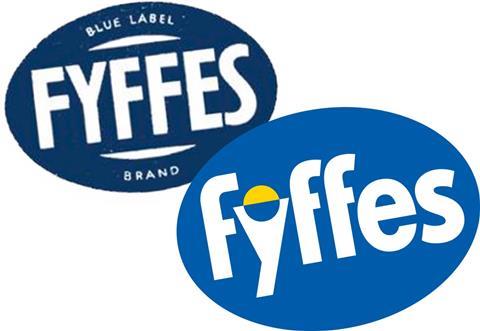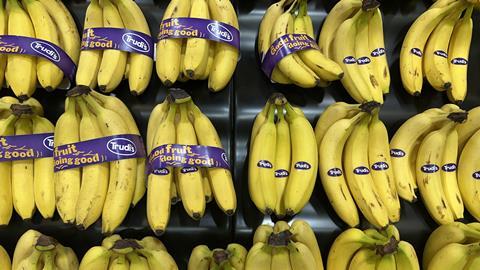Fyffes Group CEO Helge Sparsoe confirms plan to phase out label from continental Europe after extensive research suggests need for completely new consumer brand identity

This article was updated on Monday 26 February 2024 to reflect the fact that any phasing out of Fyffes in the UK and Ireland is not yet confirmed.
The world’s oldest consumer brand for fruit could soon no longer be visible to the general public in mainland Europe after almost a century on the shelves.
The Fyffes label, which was first applied to a piece fruit in the same year Enzo Ferrari put his name on a car, is to be phased out, Fruitnet can reveal.
Starting in mainland Europe, it will be replaced with Trudi’s, a new brand introduced by Fyffes in October 2023, and one it regards as a more suitable and engaging trademark for consumers in today’s international marketplace.
It is understood that the UK and Ireland, where Fyffes still has a major corporate presence despite its headquarters’ recent relocation to Geneva, will retain the Fyffes brand for the time being, before a decision is later made on whether to switch to Trudi’s.
However, as the group’s chief executive Helge Sparsoe explains in Fruitnet’s latest edition of Fruitbox, the Fyffes name will continue as a trade name.
“Fyffes today is a very well-known B2B brand, but it lacks that consumer connection which we have found in the brand Trudi’s,” he commented. “In the UK and Ireland, there is a very big brand recognition [among the general public]. But beyond those markets, it doesn’t really stand for anything when you talk to consumers.”
The company apparently spoke to more than 13,000 consumers in eight different countries about their expectations when it comes to purchasing fruit.
Based on their feedback, Sparsoe said it saw an opportunity for a label that would better communicate the positive impact supply chains can have on producer communities.
“Banana consumers today are basically buying on what we call autopilot,” he explained. “Generally you don’t give your choice of bananas a lot of attention. And you don’t really engage with the category. And we decided we wanted to change that.”
Trudi’s was introduced by Fyffes in October 2023 as the company attempted to address what it described as the widespread devaluation of fresh produce, and as it looked to meet new demand for responsibly sourced products.
Guarantee of quality
Fyffes’ connection with the fruit business actually goes back more than 130 years. On 20 September 1888, the group founded by Edward Wathen Fyffe offered its first ever banana for sale in London’s Covent Garden Market.
But it wasn’t until more than four decades later, on 16 July 1929, when Fyffes’ distinctive blue label was first placed on its imported bananas.
“The Fyffes banana brand label was the precursor to the myriad of fruit labels we see today around the world,” commented Tim Watkins, director of marketing at leading fruit label supplier Sinclair International.
“It was a genius move, linking the quality brand to an individual piece of fruit rather than relying on branding identification on the crate only. This was a sign of the company’s commitment to providing high-quality fruit and ensuring the brand found its way to the consumer’s fruit bowl.
“Today, whether it’s carrying the brand owners’ stickers or the retailers’ own labels, a label on a piece of fruit continues to be a guarantee of quality for the consumer.”
Fyffes, which was acquired by Japanese conglomerate Sumitomo Corporation in February 2017, has undergone many changes of ownership during its long history.
In 1902, United Fruit Company (now Chiquita Brands International) purchased 45 per cent of the capital in what was then a London-based banana importer called Elders & Fyffes.
In 1986, Fruit Importers of Ireland, led by the McCann family, purchased Fyffes Group from what was then called United Brands.
In March 2014, Fyffes agreed a deal to merge with Chiquita, but seven months later the deal was spiked. That same year, Chiquita shareholders accepted a takeover offer from Brazilian companies Cutrale and Safra Group.
Listen to the full interview with Helge Sparsoe below or by visiting fruitnet.com/fruitbox




